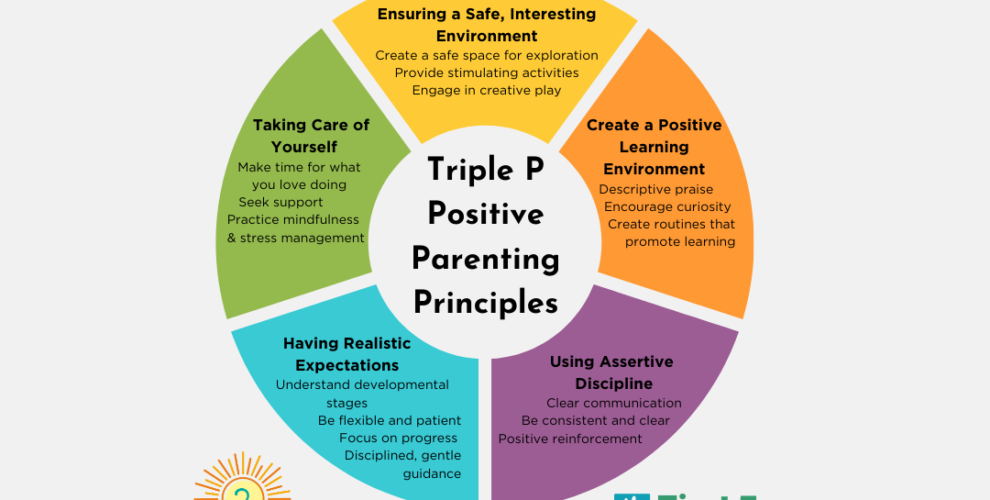The 5 Principles of Triple P Positive Parenting

Parenting can be a rewarding yet demanding journey. The Triple P (Positive Parenting Program) provides a set of principles designed to help parents foster a supportive and nurturing environment for their children. In this post, we will explore the five key principles of Triple P Positive Parenting that can enhance your parenting approach.
1. Ensuring a Safe, Interesting Environment
Creating a safe and interesting environment is fundamental for children’s development. A well-structured space allows children to explore and learn without unnecessary risks. Here are some tips to achieve this:
- Childproof your home to eliminate potential hazards and create a safe space for exploration.
- Provide stimulating activities and materials that encourage curiosity and learning, such as books, art supplies, and educational games.
- Encourage exploration by allowing your child to engage in safe physical activities, like climbing, running, and creative play.
2. Creating a Positive Learning Environment
A positive learning environment fosters growth and encourages children to take risks and learn from their experiences. To create such an environment, consider the following:
- Offer descriptive praise and celebrate efforts, regardless of the outcome. Use praise to build confidence and resilience.
- Encourage questions and curiosity. Show enthusiasm for learning by exploring new topics together.
- Incorporate routines that promote learning, such as reading together or engaging in problem-solving activities.
3. Using Assertive Discipline
Assertive discipline is about setting clear expectations and boundaries while maintaining a respectful relationship with your child. This principle emphasizes the importance of consistency and communication. Here are some strategies:
- Clearly communicate rules and expectations, ensuring your child understands what is acceptable behavior.
- Be consistent in enforcing consequences for both positive and negative behaviors, reinforcing the importance of accountability.
- Use positive reinforcement to encourage good behavior while addressing inappropriate behavior with constructive feedback.
4. Having Realistic Expectations
Understanding and setting realistic expectations is essential for effective parenting. Children develop at their own pace, and recognizing this can help reduce frustration. Here’s how to manage expectations:
- Know your child’s developmental stage and adjust your expectations accordingly. What might be reasonable for a teenager may not be for a toddler.
- Be flexible and willing to adapt your expectations as your child grows and changes.
- Focus on progress, rather than perfection, celebrating small milestones and efforts along the way.
5. Taking Care of Yourself as a Parent
Parenting can be exhausting, and it’s crucial to prioritize self-care. Taking care of yourself enables you to be the best parent possible. Consider these self-care strategies:
- Set aside time for yourself regularly, whether it’s for hobbies, exercise, or relaxation.
- Seek support from friends, family, or parenting groups to share experiences and gain encouragement.
- Practice mindfulness and stress management techniques to help maintain your well-being and resilience in the face of parenting challenges.
Conclusion
The Triple P Positive Parenting Program offers valuable principles to guide parents in creating a nurturing and supportive environment for their children. By ensuring a safe and interesting environment, fostering a positive learning atmosphere, utilizing assertive discipline, setting realistic expectations, and taking care of yourself, you can build stronger relationships with your children and support their growth and development. Embrace these principles to enhance your parenting journey!
If you are interested in participating in FREE parenting classes, sign up today by going to our website here or directly to our Eventbrite page here.

